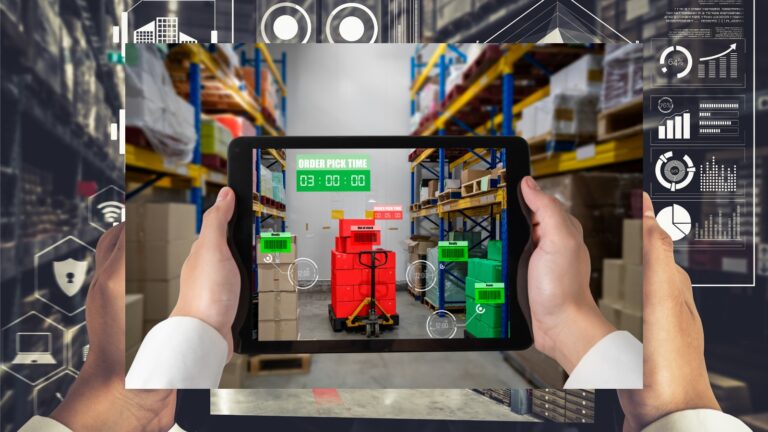The development of ‘smart warehouses’ symbolises a new era in logistics, made possible by the combination of automation and connectivity. This approach to change is giving rise to enormous prospects for efficiency, accuracy, and cost-effectiveness by changing how things are managed, distributed, and stored.
The article explores the significant effects of these developments, emphasising how they have revolutionised logistics and moved several sectors of the economy into a new era of seamless, data-driven warehouse management.
What is a 'Smart Warehouse'?

A smart warehouse is one which makes use of a variety of automated technologies and solutions to carry out warehouse tasks. For smart warehouse management, it could include both hardware, such as robots and machines, and software for warehouse automation. Due to their sensor and other digital technology setup, these warehouses operate more efficiently than traditional warehouses.
The warehouse’s layout could be improved with the implementation of this software, and sensors can be used to monitor the position of goods as it flows through the warehouse. As a result, employees spend less time roaming the warehouse and are less likely to make mistakes.
Major Challenges Faced by Logistic Industry with Manual Warehouse Management

Inefficiency
A smart warehouse is one which makes use of a variety of automated technologies and solutions to carry out warehouse tasks. For smart warehouse management, it could include both hardware, such as robots and machines, and software for warehouse automation. Due to their sensor and other digital technology setup, these warehouses operate more efficiently than traditional warehouses.
The warehouse’s layout could be improved with the implementation of this software, and sensors can be used to monitor the position of goods as it flows through the warehouse. As a result, employees spend less time roaming the warehouse and are less likely to make mistakes.
Error-Prone
Manual warehouse management exposes logistics companies to a high risk of mistakes. Humans are prone to making errors when managing things like inventories and orders, which is why this occurs. These errors can end up in issues like incorrect shipments and delays. For the logistics industry to function properly, this issue must be solved.
Limited Scalability
It is similar to having to manage all of your possessions in a small space for businesses managing their products. Manual processes become like that cramped space, holding these businesses back as they expand and seek to handle more items. The ability of logistics organisations to expand smoothly and manage increasing volumes of products effectively depends on overcoming this obstacle.
Resource Demand
As a business expands, the logistics sector needs an increasing number of employees to handle parcels. This not only raises prices but also makes it difficult for employers to recruit and educate enough workers. In order to effectively manage their operations, keep costs in check, and make sure they have the necessary staff to handle their expanding workload, logistics businesses must get over this obstacle.
Key Advantages of Smart Warehousing in Logistics

Price Reductions
Smart warehouses are like assistants that simplify the responsibilities of those who work in them. Having fewer employees and having them perform their responsibilities more effectively helps save expenses. Companies can charge customers less for products when they make financial savings. This is crucial since price often plays a big role in their purchasing decisions.
A major competitive advantage is the ability to sell products for less than competitors, which encourages more customers to purchase from that specific company. Therefore, smart warehouses provide businesses an advantage in the market by saving money for them while simultaneously making products more affordable for consumers.
Expedited Shipment
Think of intelligent warehouses as super workers that nearly never choose the incorrect item. Smart robots and automated picking systems speed up the picking process and reduce the amount of walking required of the employees. This speeds up the shipping of orders. When customers shop online, the speed of delivery comes in second place behind price as the most crucial factor.
In today’s era of online shopping, being able to dispatch items quickly is a huge benefit for businesses that engage in business online. Therefore, with smart warehouses, errors decrease, and orders are shipped out more quickly, and this makes online merchants excellent at completing deliveries swiftly and satisfying consumers.
Less Returns
Even extremely skilled humans are vulnerable to error while choosing items by hand. But smart warehouses greatly reduce the likelihood of these errors. This results in fewer incorrect orders and fewer items being returned. Customers are delighted and eager to repurchase when warehouses perform well. Despite this, some items could still be returned, this is typically not due to order errors.
Smart warehouses also aid in the speedy resolution of these problems. Robotic assistants ensure that the right items are selected, which makes clients even more satisfied. Therefore, this technology serves as smart assistants who ensure that everything runs properly and that customers keep coming back to buy more.
Increased Usage of Warehouse Space
Dealing with the little space they have for their inventories is one of the greatest issues that logistics companies encounter. However, this issue could be resolved by employing smart warehouse technology. It can make better use of the available floor space. Because there is less traffic and crowding because of robots and unique sorting technologies, shelves can grow taller and hallways can be wider.
More items will fit in the same area as a result. Good space management also results in financial savings because storing each item costs less. Buyers could gain from the cost savings, while the owner of the warehouse can benefit financially. So smart warehouses act as space-saving experts to assist maintain affordable rates or huge profits.
Predictive Order Processing
The latter improves order processing through sophisticated computer analysis and artificial intelligence. They can estimate how many orders could arrive in the future using supply chain planning by using the predictive analytical capabilities that the smart warehouse system is equipped with. This forecast aids in scheduling when many orders or few orders could arrive.
The ability to send out orders even more quickly is achieved when the layout of the warehouse, the robots, and the employees all adhere to these established presumptions. Therefore, predictive capabilities are added to smart warehouses to ensure that everything is prepared and that orders are shipped out swiftly.
Customer Satisfaction
When the logistics industry is concerned, it is mostly about getting things delivered. Making sure clients are satisfied with the service heavily relies on the entire shifting and arranging procedure as well as the broad system that connects everything. Customers are extremely satisfied with the positive outcomes of smart warehouses.
They are quite satisfied with the service since they receive items promptly, spend less, and do not have to return anything. Smart warehouses make sure that takes place, fulfilling client expectations and guaranteeing their satisfaction with the purchase process.
Optimisation of the Warehouse
Modern technology including enterprise software, analytical tools, and machine learning algorithms are available in smart warehouses. These advanced technologies have the potential to significantly boost the efficiency of logistical tasks.
The warehouse employees can identify what isn’t operating properly and come up with solutions to improve things with the use of these technologies. These sophisticated warehouse technologies can keep an eye on crucial factors like how smoothly everything is running and assist in determining what improvements would improve things. Such innovations allow warehouses to improve and become more knowledgeable about what they do.
Cerexio ‘Smart Warehousing’

Cerexio-empowered, smart warehousing technology is a software solution that tailors sophisticated technological tools and advanced software suites that are associated with modern warehousing technologies. This solution makes the logistic companies utilise their resources at an optimal level and boost business operations through the implementation of the fusion of these cutting-edge tools. Enhancing warehouse security, and elevating efficiency high to ensure timely delivery makes our software solution stand out from others.
Embarking on a Smart Business Journey with Cutting-Edge Technology

If you are seeking innovative ways to boost efficiency and business operations 100%, you must walk away from traditional methods and opt for new-era solutions. However, you need to make sure that the features of the software you purchase well-aligns with the company’s needs. This is a small reminder for those who are interested in modern solutions for logistics.
